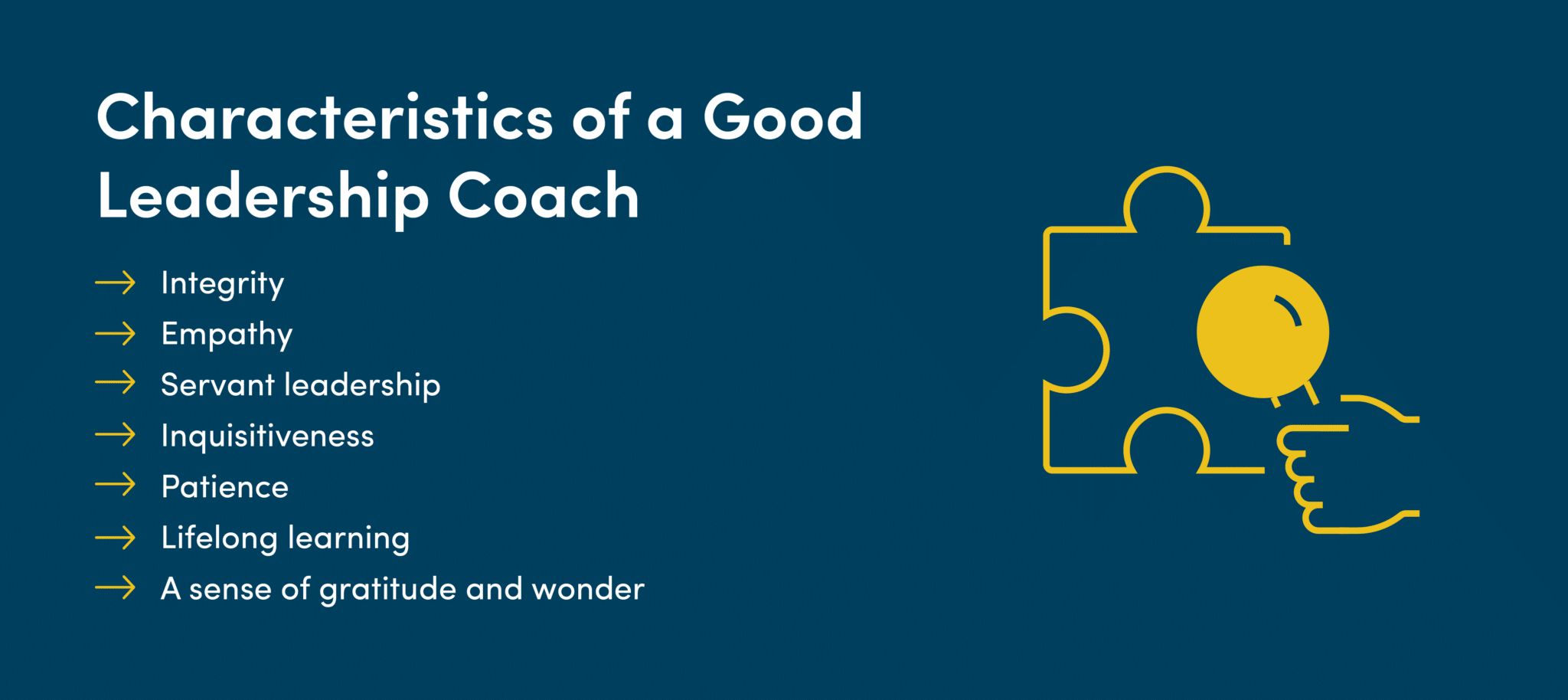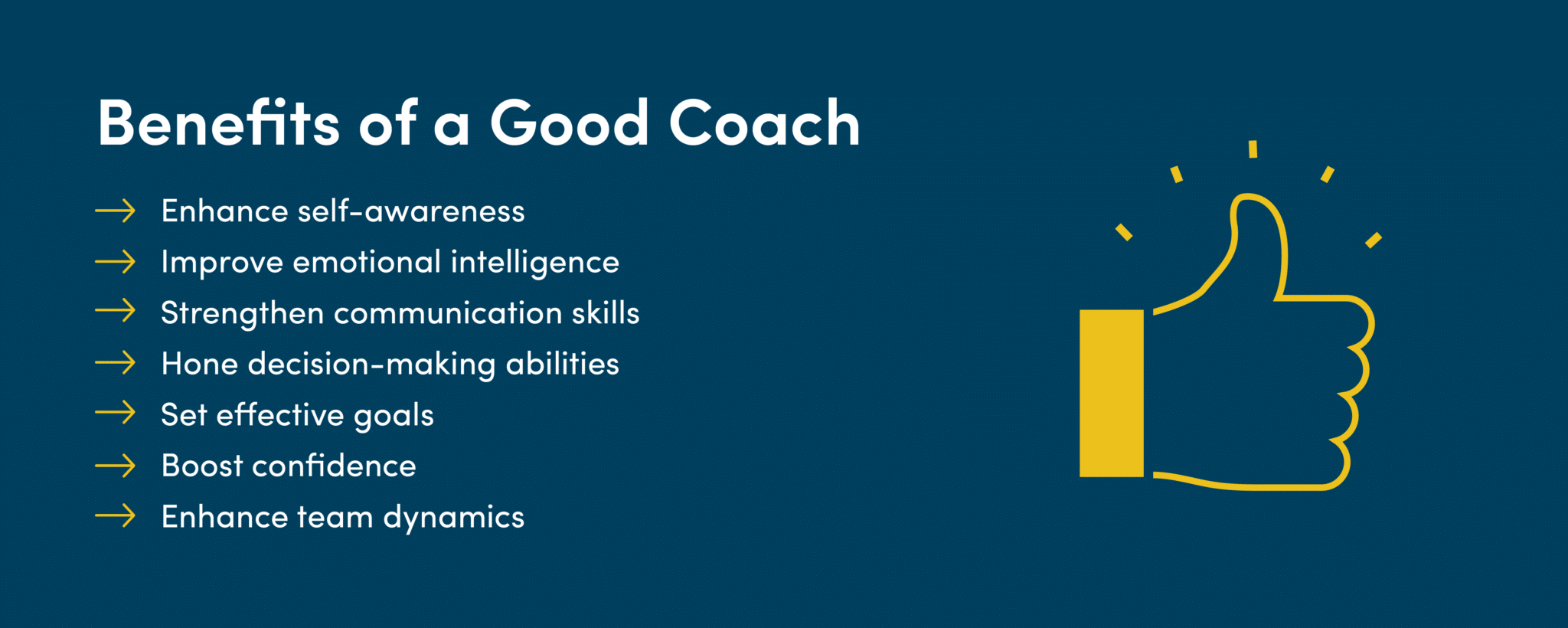What Are the Top Characteristics of a Good Coach

CEOs spend years building their leadership toolkit. When retirement or change-of-career time approaches, the idea of helping others expand their leadership abilities often appeals.
But do all good leaders make effective leadership development coaches? How can you tell if you have what it takes to coach like a champ?
While the experience you’ve gained over the course of your career can provide valuable insight to anyone looking to advance in your field, coaching requires a specific skill set that will allow you to inspire and motivate those who feel stuck or are ready to move to the next level. Understanding the skills required to successfully become an executive coach can help you avoid executive coaching mistakes while forging your way into a new career path.
We asked for insights from leadership development coaches of various experience levels, from relative newcomers to decade-plus veterans. Here’s what they had to say when we asked what makes a great coach.
- Integrity
- Empathy
- Servant leadership
- Inquisitiveness
- Patience
- Lifelong learning
- A sense of gratitude and wonder

1. Integrity
Across the board, integrity is the cornerstone of coaching. Becky Tolnay, who launched a coaching practice last year, always starts with trust. “People need to believe you,” she says. “You need to do what you say you’re going to do.”
Allan Fried, who has been coaching for more than 17 years, agrees. “You’ve got to walk the walk,” he says. “You can’t talk to clients about accepting feedback, being truthful, treating people with respect, and not behaving that way, too.”
“Sometimes clients aren’t even telling their spouses the things they’re telling you,” adds Williams. “They won’t share unless they trust you. That’s foundational.”
2. Empathy
If integrity is the bedrock on which coaching is built, empathy and emotional intelligence supply much of the structure. “If you don’t have strong emotional intelligence, you cannot be an effective coach. It’s impossible,” says Bradley.
Empathy ranks high on the list for Williams as well. Only by inhabiting the client’s perspective can a coach deliver the value clients expect.
“You need to meet people where they are and help them,” he says. “You have to understand what they really want to get out of the relationship, whether they’re looking for better accountability, isolation relief, getting certain business results.”
3. Servant leadership
Visit Chuck Alvey’s social media profile, and you’ll see he brands himself a “servant leader.” That’s how important this trait is to him. A 10-year coaching veteran, Alvey believes a leadership development coach cannot focus on “what’s in it for me.” They must care most about what’s in it for others.
Williams is equally dedicated but also interrogates the servant leadership concept. “Does servant leadership mean subservient?” he asks. “No, it doesn’t mean you nod and tell them they’re doing a great job all the time. It means you challenge them when they need to be challenged.”
Often, Williams says he tests that notion by raising delicate topics some clients might prefer to avoid. “But I’m going to ask because I care about them.”

One of the top characteristics of a good coach is embracing the servant leadership style, where the leader prioritizes serving and supporting the needs of their team members. However, not every organization feels their leadership team is up to par. In fact, 77% of businesses claim they experience a gap in leadership, with only 11% of organizations claiming they have a strong leadership bench. Ensuring leadership has the tools and resources necessary to foster the growth and well-being of their team is essential, and finding leaders who embrace the servant leadership style can help organizations reach a strong leadership bench.
4. Inquisitiveness
Speaking of questions, Williams highlights the value of asking over telling. “The insights that result in the most meaningful breakthroughs come because you asked great questions, not because you gave them the answer.”
Tolnay draws on her inquisitiveness specifically to help clients dig deeper. “Curiosity is so important because if you’re not asking questions, you’re just going to get the surface of everything.”
Your clients will also be able to exemplify this behavior with their teams, showing how to carefully collect information to inform their decision-making skills.
5. Patience
As fulfilling as all of these coaches find their work, they are open about the challenges inherent in effecting change. Meaningful transformation takes time, which is why Williams emphasizes that coaches need patience.
“Leadership development sometimes feels like you’re watching the grass grow,” he says, explaining that it can take years for clients to make progress in critical areas.
This is why Tolnay, too, recommends patience. “People won’t always come right to whatever the challenge or issue is,” she says. “You sometimes have to work through many levels of conversation to get to it.”
6. Lifelong learning
Although these coaches benefit from firsthand leadership experience when establishing their credibility, they all resist the inclination to rest on those laurels.
Williams works hard to stay up-to-date with the current issues affecting businesses through continuous learning so he can “coach people now.”
“You won’t have a sustained practice without lifelong learning,” Williams says. “You can blossom, but you will fizzle unless you’re evolving and growing.”
Fried knows he can’t remain static, either, because his clients won’t. “I need to be learning and sharpening my skills, or they’ll surpass me.”
7. A sense of gratitude and wonder
Perhaps the most amazing aspect of these conversations is the deep humility even top-performing leadership development coaches convey. For someone like Bradley, “It’s an honor to be a leader of leaders,” and he strives every day to live up to the responsibility.
How can other retired and retiring executives know if they’re ready to coach? Our panel suggests interviewing with a coaching organization, having strategic conversations with others in the business, trying on the coaching role on an ad hoc basis, taking online personality assessments, and talking to friends, family, and colleagues who know your background, temperament, and natural abilities.
Alvey offers one more recommendation, turn your curiosity toward yourself. One of the most powerful lines of inquiry, in his opinion, is to monitor your reaction to the people you encounter. “In your head, do you judge or do you wonder?”
Great leadership development coaches are full of wonder about people’s stories, personal journeys, and the futures emerging for them on the horizon. If wonder describes your dominant attitude, you may have found your next career in coaching.
What Are the Benefits of a Good Coach?
In order to provide your clients with the executive coach skills that will take them to the next level, it’s important that you understand your own value. Here, we’ll take a look at how working with an executive coach can help clients reach their full potential.

1. Enhance self-awareness
It’s tough to take a step back and see ourselves accurately, and a good coach can help clients understand their blind spots. This part of the coaching process can be tough, and it’s normal to find that clients are defensive when you begin to point out their shortcomings.
Using empathy and integrity–as well as providing hard evidence to back up your observations–can help create a relationship that allows clients to examine their own behaviors through enhanced self-awareness. Once clients are aware of where they’re falling short, they’re better able to change their negative patterns at the moment.
2. Improve emotional intelligence
As a coach, you know how to talk to people–and you can help your clients bolster their emotional intelligence to increase their effectiveness as a leader. When your clients learn to recognize signs that their team is stressed and struggling, they’re better able to take steps to support employee satisfaction and maintain or boost productivity despite difficult circumstances.
3. Strengthen communication skills
Success in the corporate world requires strong and effective communication skills. In your role as a professional coach, you’ll be able to both model and practice effective communication and active listening with your clients. This can go a long way in helping them foster positive relationships with their teams.
4. Hone decision-making abilities
Leaders who struggle with second-guessing their own decisions may come off as weak or inept to their teams. As a coach, you’re able to help your clients quickly weigh the pros and cons of an issue and state their decisions with confidence.
5. Set effective goals
In order to know where you’re going, you need to know where you’re starting. The unbiased opinion of a coach can help leaders set achievable goals for themselves and their teams. Goal setting is a critical skill of any executive coach, as it helps them work with their clients to create a game plan that they can follow to achieve desirable outcomes.
6. Boost confidence
Many professionals often question whether they have the traits of a great coach–even if they’d never admit it out loud. Working with a coach allows leaders to learn what they’re doing well and strategize on how to improve their weak spots, leading to an overall boost in confidence.
7. Enhance team dynamics
Passive-aggressive behavior, resentment, and a lack of trust can all make it hard for a team to work together. Good news: coaching can get to the root of these issues and enhance the dynamics of a professional team. As a coach, you’re able to provide your clients with an unbiased opinion and plan to drive the organization forward.
Wrapping Up: The Top Characteristics of a Good Coach
It’s likely that you already have the qualities of a coach that support client success: you’re committed to honing your craft, you’re able to take a step back and get curious about the big picture, and you serve your clients with integrity, and empathy. Understanding how the traits of a good coach can benefit clients helps you to believe in your work, further bolstering client growth, the most important metric in measuring success as an executive coach. Working to constantly up your game by further developing the traits of a good coach allows you to live by example, and sharing this drive to improve openly with your clients can inspire them to do the same.
Category: Mission, Vision, Purpose
Tags: CEO leadership, CEOs, executive coaching, Vistage Chair

